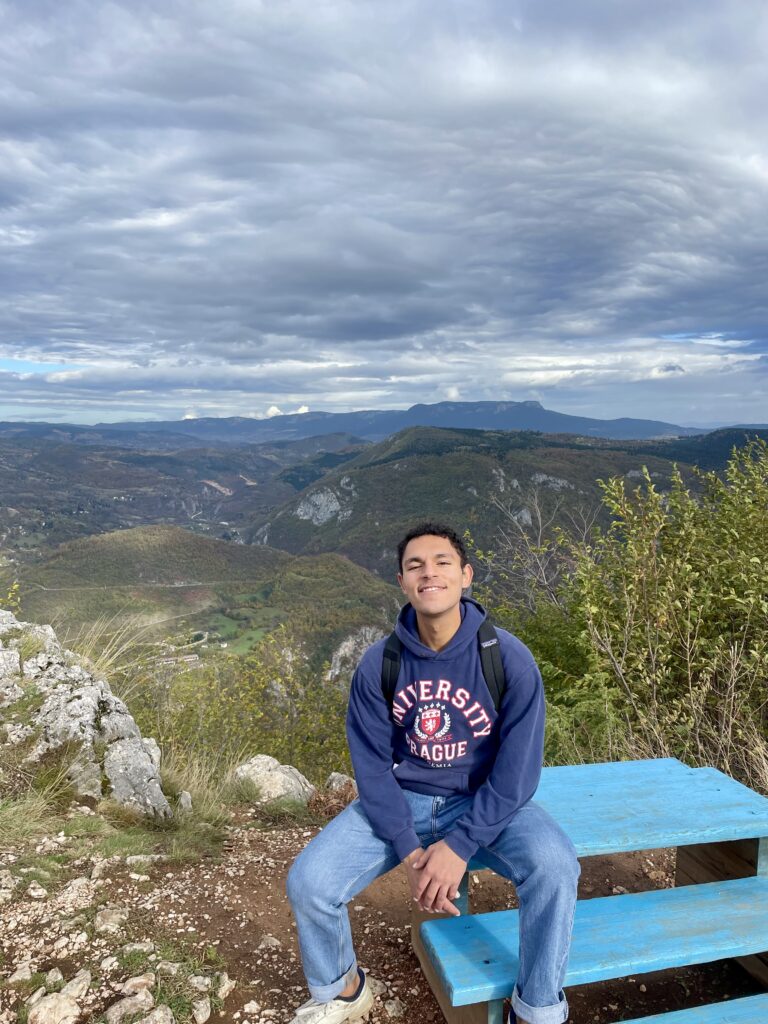NEWS | RESIDENCY
Welcome James Roberson
1 June, 2024
in-tangible institute welcomes James Roberson as its inaugural ‘Creative In Residence’ from 1 June – 15 July, 2024, with thanks to the POZEN Family Centre for Human Rights, University of Chicago.
James’ residency runs in conjunction with two in-tangible institute programs. While in residence, he will be working towards the realization of a community workshop with select members of the Myanmar migrant community in Chiang Mai. This private event hosted by MAIIAM Contemporary Art Museum is followed by a public music event on 6 July (stay tuned!)
James’ workshop responds to Burmica, a large-scale artwork by Thai artist Ubatsat. The painting collages images from Burma/Myanmar’s calamitous history and is an integral part of in-tangible’s curated exhibition Living Another Future, on view at MAIIAM 24 May 2024 – 3 June 2025. Secondly, James’ research engages the themes of POLLINATION Edition 4, an exploration of faith, migration, and politics between the contexts of Malaysia and Myanmar curated by Mark Teh and Diana Nway Htwe.
About James
James Roberson (he/him) is a student from Southern California, majoring in Political Science and Human Rights at the University of Chicago and the London School of Economics.
Between Chicago and London, James writes and designs self-published “zines” that explore relationships between institutions and the individuals they govern, with the most recent edition exploring Bosnia and Herzegovina’s post-conflict struggles. Additionally, he hosts a weekly radio show titled mental clutter that highlights music from around the world and the alternate political realities music creates, from the explosion of Kampala’s DIY techno amidst the harshest LGBTQ+ laws in the world to São Paulo’s baile funk conceived by Afro-Brazilians in favelas who continue to resist state persecution and marginalization.
James has also worked in the world of criminal justice as a creative writing facilitator at the Cook County Jail and at the Manhattan District Attorney’s Office, tasked with realizing the Gun Violence Prevention Grant and analyzing data for prosecutorial reform.
About in-tangible institute ‘Creative In Residence’ program
This program seeks minds who understand why the world needs to be decentralized in how it thinks, values, defines, recalls and attends to cultural memory. To decentralise is to question who has the right to speak and for whom. To decentralise is to propel alternate perspectives on what is considered standard, original, and authentic. To decentralise is to understand the art of collaboration, of shared knowledge, and the necessity to study the hidden and the overlooked.
This program focuses on the contexts and experiences of those hailing from globalizing souths, whose (enforced and voluntary) migratory experiences have forged transoceanic alliances of exchange and knowledge in the aftermath of colonial violence. The program endeavours to prompt critical encounters with disparate cultural memories, with the hope of challenging the assumptions of our systematized social worlds, whose realities are fashioned by hegemonic economies and histories bound to nation-building.
Inviting a range of creative thinkers—writers, artists, curators, collectors, theorists, social scientists, musicians, filmmakers, and more—this program asks that residents engage our local community through their research. Via talks, screenings, seminars, workshops, music nights, or live conversations, residents are expected to spend time inspiring others rather than producing new individual work.
About POZEN Family Centre for Human Rights
The Pozen Family Center for Human Rights at the University of Chicago supports innovative interdisciplinary teaching and research initiatives that critically explore the theory and practice of global human rights.


